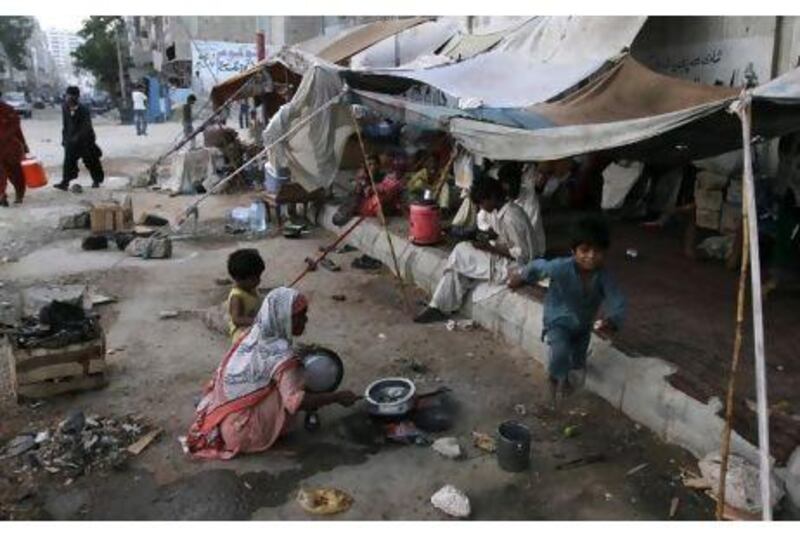KARACHI // Sometimes, politically motivated killings in Karachi rise, as they did after a councillor was assassinated this year and more than 100 people died in 72 hours of revenge attacks.
But on most days, the hum of death in Pakistan's largest city is steady and routine. It is fuelled by the city's ethnic political parties and their "land mafias", who fight to control property that provides profits and political power.
Politicians and police show no inclination to impose order on the violent and chaotic land development business. Many of them profit from it too.
"This violence becomes ethnic and political, but it always eventually calms down after an agreement over the land is reached," said Parveen Rehman, the director of the Orangi Pilot Project, one of the only organisations in Karachi that maps urban development.
Violent groups affiliated with the city's three major political parties grab large tracts of public land and develop them, according to experts on land use, community activists, political analysts and police officials. They profit from the development and populate the areas with people loyal to their parties.
"Political organisations have armed cadres, who are sometimes linked with various elements who are active in the informal economy, particularly with regard to land," Haris Gazdar, a director of the Karachi-based Social Science Research Centre said.
In the older sections of the city, commercial buildings and expensive apartment blocks are built on the illegally developed land. In undeveloped areas, informal housing known as "katchi abadis" are constructed for the hundreds of thousands of people who flock to the city each year.
Land "grabbed" on the borders of Karachi's ethnically divided neighbourhoods regularly sparks tit-for-tat violence. Many times, innocent people are targeted because of their ethnicity.
This battle pits the party that represents Karachi's long dominant Urdu-speaking population, known as Muhajirs, against the party that claims to speak on behalf of the rapidly growing Pashtun community.
The Muttahaida Qaumi Movement (MQM) claims that the Pashtun Awami National Party (ANP) is responsible for the murders and for protecting land grabbers and terrorists. The ANP counters that the MQM kills innocent Pashtuns because it is unwilling to cede any control of the city, even though Pashtuns now constitute about one quarter of its population.
In Katti Pahari, an area that sits between Muhajir and Pashtun neighbourhoods, what was once a park is now filled with dozens of houses and apartment buildings. A nearby resident, Naseeb, who would not give his last name for fear of reprisal, said that for two weeks ANP and MQM gunmen fought in the park.
"The rangers and police would come to stop the firing, but then they would leave and the fighting would start again at night. One, two random people were getting killed here every day," he said.
Land prices in Karachi have skyrocketed over the past decade. After September 11, the economy boomed with the help of money the United States provided in return for co-operation in its fight against militants. As a result, the property market, inflated both by developers and speculators, ballooned.
Further, International Monetary Fund loans to Pakistan required that the government sell public land in the city to private industry, limiting supply, according to Arif Hasan, a Karachi-based urban planner.
The cost of renting a city-centre apartment soared, "so if you put up a few 10-apartment buildings in a park, you can imagine the kind of money involved", Ms Rehman said.
By controlling land, parties begin to control the government. They create "vote banks", areas dominated by a particular ethnic group.
On the city's periphery, abundant empty land is being settled by migrants, and political parties have an interest in engineering the ethnic make-up of these areas.
According to Ms Rehman, 3,000 acres, or 100,000 plots that house one million new residents, are developed by illegal land suppliers each year. Seventy per cent of Karachi's residents live in these unofficial settlements, or "katchi abadis", she said.
"This kind of land grabbing provides money to the political parties, but it also enhances their vote bank by changing the demographics of the areas where these land grabs are taking place," said Amber Alibhai, the secretary-general of Shehri, an advocacy group that supports sustainable urban development. A Shehri activist was murdered last year after launching a vocal campaign against land grabbing.
The state is partly responsible for the violence because it does not have adequate policies to guide the city's development. Activists say government officials and the police both profit from the haphazard and unregulated development in Karachi.
If the government wanted to stop the violence, it "would have some plan for providing housing to all these people. But no planning is also a strategy. Officials, the police, they are all involved and there are set prices that must be paid," Ms Rehman said. "How will they make money if all this is formalised?"





